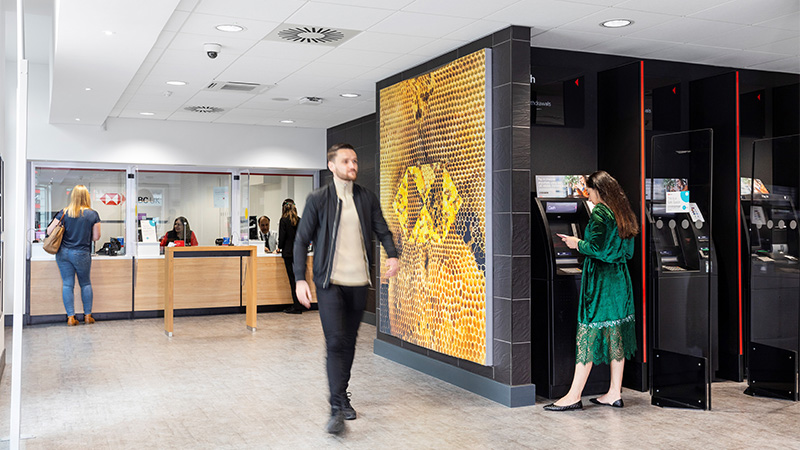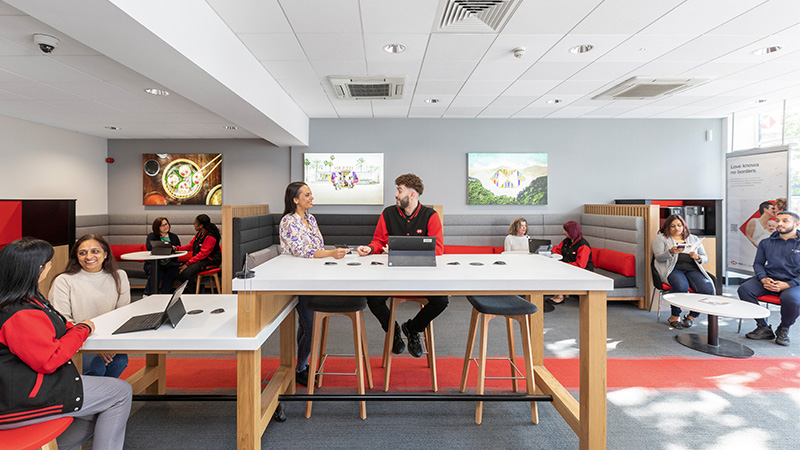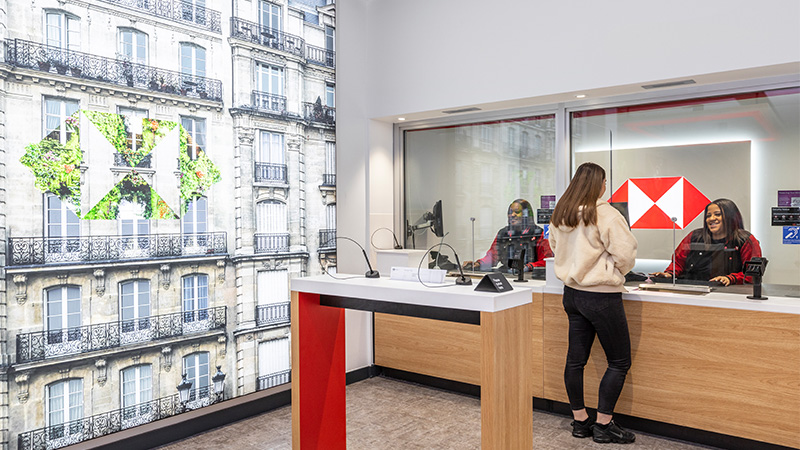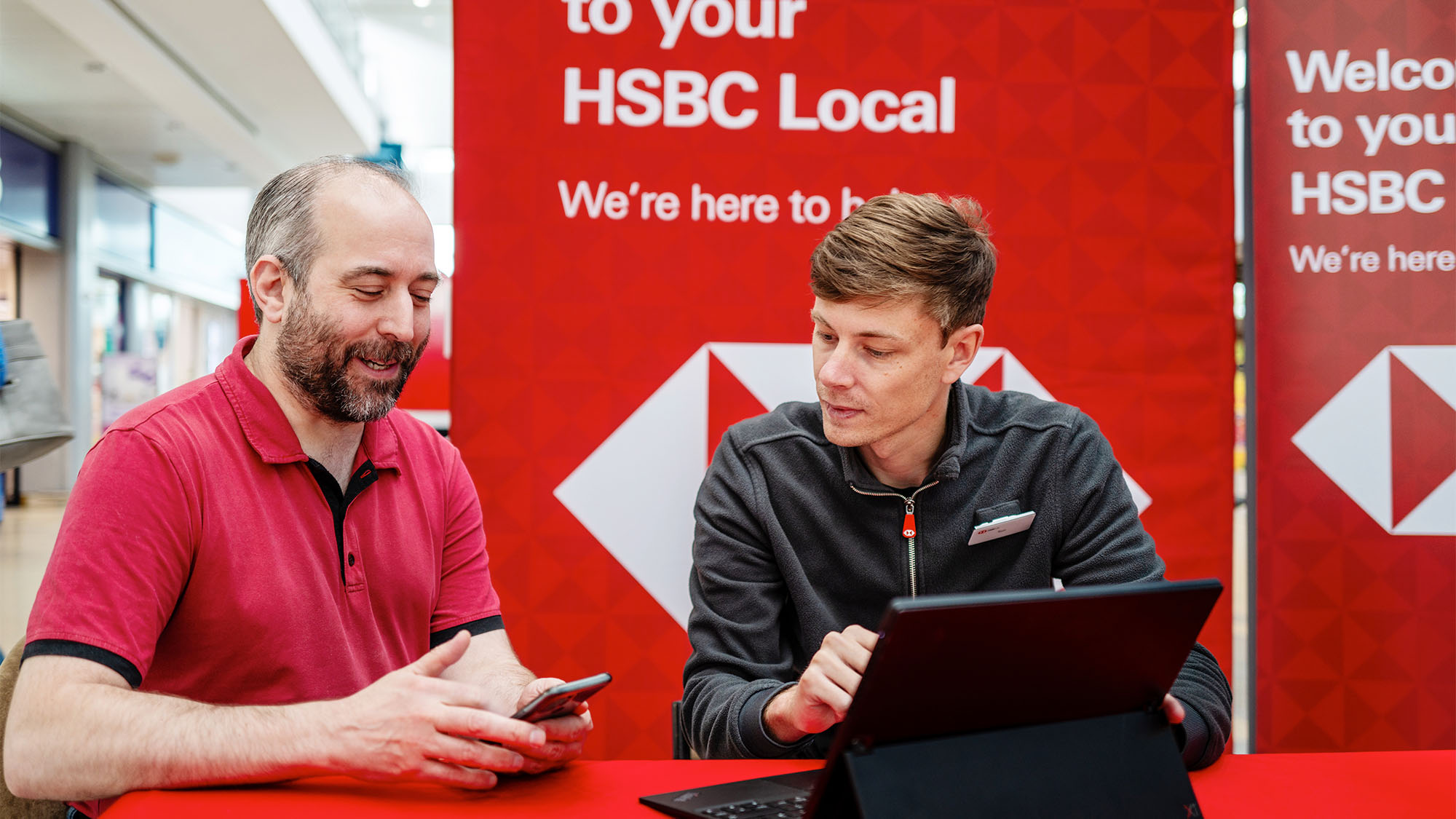If you want to visit one of our branches, you can find the nearest one to you and check the opening times.
Our branch finder also shows what you'll find there, for example 24-hour cash machines or disabled access.
See how we can help you:
Our branch formats
We now have 3 different formats for our branches. Please take a look at how the formats differ before planning your visit.

Full Service Branch
Support for all your simple or complex banking needs, with access to a counter service, branch colleagues and specialists on site.
You can access:
- counter facilities
- product opening support
- account servicing, such as payments and statements
- life event support, such as bereavement or power of attorney
- cash and cheque machines via self service zones
- digital education and community support
- branch specialists for products such as mortgages
Digital Service Branch
Counterless service, with our branch colleagues on hand to help you make the most of our self-service and digital channels.
You can access:
- product opening support
- account servicing, such as payments and statements
- life event support, such as bereavement or power of attorney
- cash and cheque machines via self service zones
- digital education and community support


Cash Service Branch
Easy access to cash, with quick, simple transactions through a counter service. Branch colleagues available by appointment to support with banking needs.
You can access:
- counter facilities
- product completion support
- account servicing, such as payments and statements
- life event support, such as bereavement or power of attorney
- cash and cheque machines via self service zones
- digital education
Self service
Our self service machines are easy to use, secure and available in many of our branches. Ask one of our branch colleagues if you need help. Find out more on each machine below:
Cash machines
Day or night, you can use our ATMs to withdraw money, check your balance and more:
- cash withdrawals
- print mini statements
- charity donations
- money transfers
- credit card payments
- balance enquiries
Express banking
You can use our express banking machines to carry out some of your everyday banking:
- view and print transactions
- make a payment
- check your balance
- transfer money
- manage standing orders and Direct Debits
- pay bill
Pay in cash
You can pay in cash using our pay in cash machine. To do this, you will need your HSBC debit card. Ask one of our branch colleagues if you need help.
HSBC reserves the right to decline damaged or defaced banknotes. To find out how to exchange damaged Bank of England banknotes visit the Bank of England website, select 'Banknotes', then 'Damaged and contaminated banknotes'.
Pay in cheque
You can pay in cheques using our pay in cheque machine. To do this, you will need to complete a paying in slip along with your sort code and account number or debit card.
You can also pay in cheques easily with the HSBC Mobile Banking app, with a limit of £2,000. You can pay in one or more cheques up to this amount per day.
You’re only able to deposit cheques in pound sterling using the mobile cheque deposit feature. International cheques will need to be paid in at a counter in a Full Service or Cash Service branch.
Our branch finder tool can help you find your nearest branch.
What to expect
These sessions will be conducted in a group but your identity as an attendee will remain anonymous. You will have the opportunity to ask us any questions that you may have. We have a number of different sessions you can join including:
Introduction to digital
Get to know more about banking with us digitally, such as on your computer or through your mobile device.
Together against fraud
Learn how to protect yourself against the latest frauds and scams, and what to do if you are suspicious.
Banking beyond the branch
Find out the alternative ways you can manage your finances such as through our app, by phone or at your local post office.
HSBC Local
HSBC Local is here to help in a space in local communities.
You can have face-to-face conversations with some of our branch experts in local communities across the UK.
Accessibility in our branches
Our accessible branches have the following:
- a hearing loop
- an accessible ATM either inside or outside
- access to the branch via a ramp, lift or portable ramp
- an internal accessible lift or ramp
- varied counter heights
- quiet hour
- sign language
- see-through face coverings
Specific accessibility features will vary depending on the branch layout.
A non-accessible branch has no wheelchair access. It'll also have more than one of the accessible features missing.
Some of our branches are partially accessible. This means they're missing one or more of the accessible features. Those branches will offer alternative support where possible, or direct you to the nearest branch that meets your needs. We also recommend taking a look at our online and mobile banking services.
Branch quiet hour
We understand the importance of making our branches inclusive and accessible for everybody.
We run a quiet hour between 14:00 and 15:00 in all of our UK branches. This is to support customers and families with conditions such as autism, dementia and ADHD.
During quiet hour, there will be:
- a designated quiet space, if you need it
- a reduction of noise - HSBC UK radio will be switched off
- increased awareness and support from staff

Branch closures
Closure Impact Analysis and Stakeholder Engagement reports
Making sure we have a sustainable branch network that is fit for the future is essential to us and decisions to close branches are not taken lightly. In recent years, as more digital capability has been introduced, our customers are increasingly using Online, Mobile and Telephone banking.
- over the past 5 years, use of the bank’s branch network by regular customers has fallen by 65%
- 90% of people do their banking online, using our app or by phone
- 99% of cash withdrawals are made at an ATM
As a result, we sometimes have to make the difficult decision to close a branch. HSBC fully supports and follows the FCA Finalised Guidance on branch closures (FG22/6) dated October 2022 and the industry-wide Access to Banking Standard introduced by UK Finance in May 2017.





